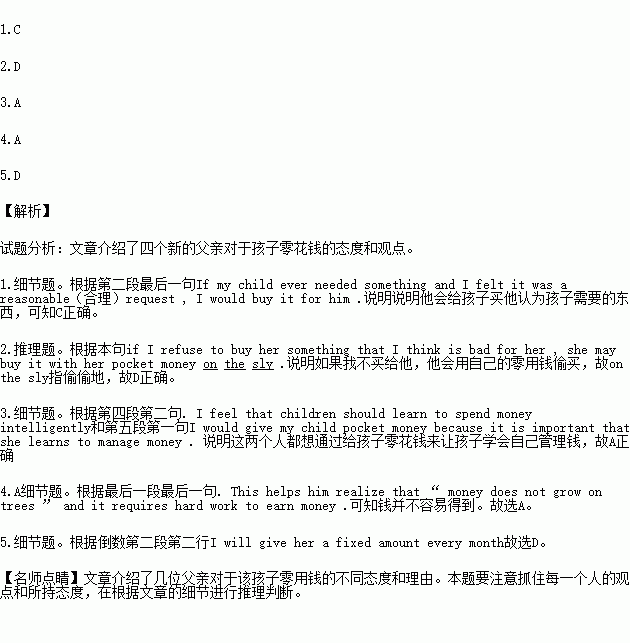题目内容
Parents have widely different views on the problem of pocket money. Four new fathers were asked this question and this is how they answered.
Ashish Khanna: Although many argue that pocket money helps develop children’s sense of value, I don’t agree. I wouldn’t give my child any pocket money. First of all, I never got pocket money and I seem to have a good value for money. If my child ever needed something and I felt it was a reasonable(合理)request , I would buy it for him .
Sharad Sanghi: No, I wouldn’t give my child pocket money because I don’t want to create the perception(观念) of “ her ” money and “ my ” money . Besides, if I refuse to buy her something that I think is bad for her, she may buy it with her pocket money on the sly. In this way, I would lose control over my child’s requests. I feel it also encourages children to care more about money than anything else. I don’t want my child to start judging(评判) other children by the amount of money or pocket money they have.
Rakesh Shah: Yes, I would give my child pocket money. I feel that children should learn to spend money intelligently and not go overboard spending. They will learn what their limitations(限制)are and feel the difficulty when they have to pay for something that is over their own pockets .
Rajiv Patel: Yes, I would give my child pocket money because it is important that she learns to manage money. I will give her a fixed amount every month and if she spends the money before the month is over, then she will learn a lesson and not spend money so freely.
Vikram Desai: Yes, I would certainly give my child pocket money. But I would not give it to him on a weekly or monthly basis. He would have to earn it. If he helped me finish some of my jobs or helped his mother with housework, I would reward him. This helps him realize that “money does not grow on trees” and it requires hard work to earn money.
1.Ashish Khanna may agree that ___________.
A. he was given too much pocket money when young
B. he can take much control of his child by money
C. he will buy anything he thinks his child really needs
D. pocket money helps children develop a good value for money
2.The underlined phrase “on the sly” in Paragraph 3 is closest in meaning to ___.
A. for free B. at a lower price
C. happily D. secretly
3.What do Rakesh Shah and Rajiv Patel have in common?
A. They want their children to learn to manage money.
B. They ask their children to get pocket money by working.
C. They teach their children the difficulty of making money.
D. They allow their children to spend money freely.
4.According to Vikram Desai, children’s earning money by themselves makes them know that ___.
A. money is not easy to get
B. money can be gotten from the trees
C. one can get lots of money if he / she works hard
D. money is not so important for people nowadays
5.Who would give his child pocket money every month ?
A. Ashish Khanna B. Sharad Sanghi
C. Rakesh Shah D. Rajiv Patel
 备战中考寒假系列答案
备战中考寒假系列答案

